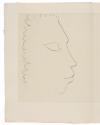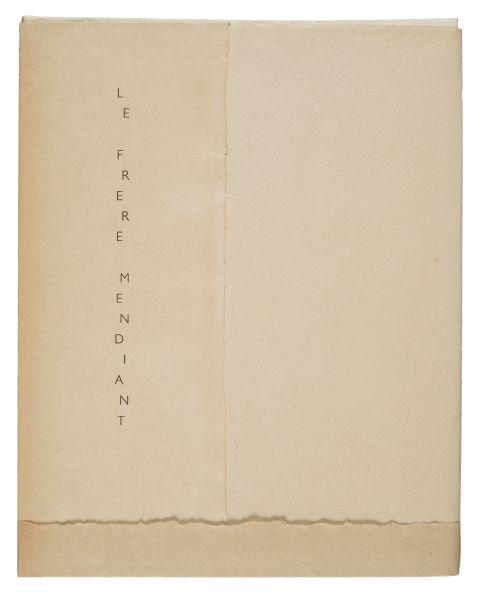The Mendicant Friar or The Book of Knowledge (Le Frère mendiant, ó libro del conocimiento)
Artist: Pablo Picasso (Spanish (active France), 1881-1973)
Publisher: Latitud Cuarenta y Uno, Paris, 1959 [Le degré quarante et un] (Iliazd)
Printer: drypoints: Roger Lacourière and Jacques Frelau, [Paris]; text: l’Imprimerie Union, [Paris] (Raymond Billoir)
Author: Iliazd (Ilia Zdanevitch) (Russian, 1894-1975)
Date: 1959
Dimensions:
Slipcase: H: 17 9/16 in. (446 mm); W: 13 3/4 in. (350 mm); Depth: 1 7/8 in. (48 mm).
Chemise: H: 17 5/16 in. (439 mm); W: 13 1/2 in. (343 mm); Depth: 1 9/16 in. (39 mm).
Cover: H: 16 5/8 in. (423 mm); W: 13 7/16 in. (341 mm); Depth: 1 1/8 in. (29 mm).
Book: H: 17 in. (432 mm); W: 13 1/4 in. (337 mm); Depth: 1 1/16 in. (27 mm).
Page: H: 16 1/8 in. (410 mm); W: 12 in. (305 mm).
Medium: Original prints: 17 drypoints, incl. 1 double page image repeated on wrappers.
Text: letterpress in black with sanguine (typeface: Gill Sans capitals).
Paper: antique Japan paper.
Classification: Books
Credit Line: Gift of Molly and Walter Bareiss in honor of Barbara K. Sutherland
Object number: 1984.922
Label Text:Original prints by Picasso are included in more than140 books published during his lifetime. No other major 20th century artist provided illustrations for as many books. Some projects involved the artist personally, some merely used his artwork. Picasso frequently collaborated with the Russian designer Iliazd (Ilia Zdanevitch, 1894–1973). This is an example of the books they produced together. Each contains an unusual text, set in a unique composition and bound in vellum (animal skin).
The text for Le Frère mendiant is the African travel diary of an unnamed Spanish monk living in the 14th century. Iliazd’s wife was African and he was fascinated with African culture. He wrote in the preface, “In the light of the past, the knowledge of the mendicant friar is admirable, and the soberness of his writings makes them pertinent today. He preaches neither conversion nor the taking of the rich, abundant African lands, personified by kings equal in nobility to the sovereigns of Europe and Asia.”
The text for Le Frère mendiant is the African travel diary of an unnamed Spanish monk living in the 14th century. Iliazd’s wife was African and he was fascinated with African culture. He wrote in the preface, “In the light of the past, the knowledge of the mendicant friar is admirable, and the soberness of his writings makes them pertinent today. He preaches neither conversion nor the taking of the rich, abundant African lands, personified by kings equal in nobility to the sovereigns of Europe and Asia.”
Not on view
In Collection(s)










